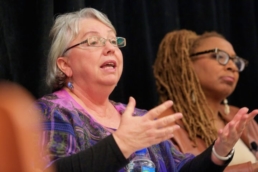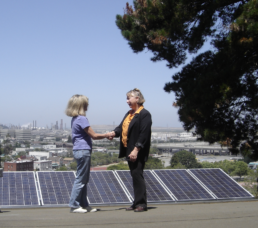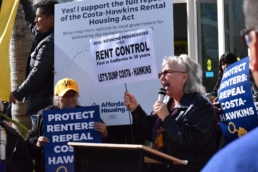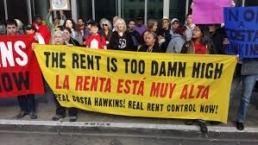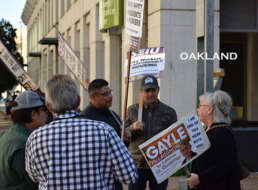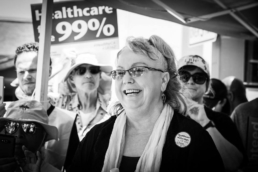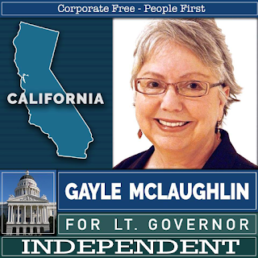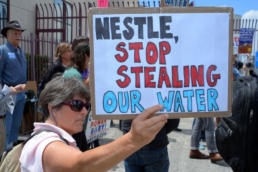Left Forum 2018: Towards a New Strategy for the Left
Left Forum, a 501c3 nonprofit which envisions a world in which radical imagination becomes a tool for self-empowerment that challenges society to build a process for collaborative and emancipatory leadership, will host the Left Forum 2018 conference June 1-3 at John Jay College in New York City.
Even though some of the most dangerous and oppressive aspects of America - rapacious capitalism and foundational racism and misogyny - have come out of the shadows and into a chillingly clear light, we believe these are invigorating times for a left resurgence.
Still, our own movements - for worker power, race, gender and sexuality, justice, ecological healing, anti-war and a broad anti-white-nationalist front - while under attack, are also on the rise. To make gains, to win battles, we must build a strong unified left which moves beyond the constructed dichotomies of class and identity, violence and nonviolence, reform and revolution.
And the space for left unity and power building is Left Forum 2018.
Running from June 1-3 at John Jay College in New York City, the conference will see a range of speakers, activists and public figures meeting to discuss topics and issues including environmentalism, sexual, racial and class equality, workers rights, anti-war strategies and more, striving to advance causes and build alliances to effect real change in the world. In this way, Left Forum is the focal point and meeting ground for people with radical ideas.
Among those speaking are award-winning investigative reporter Juan Gonzalez; Kali Akuno, co-director of Cooperation Jackson; Jane Sanders of the Sanders institute; Gayle McLaughlin, the former Mayor of Richmond, California; Paul Jay, CEO of The Real News Network; Ajamu Baraka, Green Party vice presidential nominee; political activist Medea Benjaminof Code Pink; economist Samir Amin; political economist and author David Harvey; and Richard Wolff of Democracy at Work.
Left Forum 2018 will also feature a series of musical acts performing in John Jay's Black Box Theater, bringing a range of styles and including performances by Reverend Billy and the Stop Shopping Choir, Nia & Ness, Raymond Nat Turner, and Jeremiah Hosea & the Narco Bourgeois with Jerome Jordan and Swiss Chris (featuring a special performance by Gabriella Callender), while Rebel Diaz will host a panel exploring the potential for hip hop to build left-leaning youth movements.
In this nurturing atmosphere of solidarity and cooperative action, Left Forum co-directors Ashley Abbott and Marcus Graetsch are optimistic about what the conference can achieve, with Abbott saying, "The left has a uniquely robust power source gathering at the intersection of issues, identities, ideologies and constituencies. There are so many examples of this model of convergence and creative action today. This is the model on which we come together to formulate new strategies for a new world. Left Forum can be a living example of the exact opposite of division and destruction: a new convergence and a space for possibility, for hope and for power."
The Left Forum will feature keynote speakers each night, exploring and constructing a narrative based on this year's theme - "Towards A New Strategy For The Left." Friday night's opening plenary will dissect how we arrived here and will be followed on Saturday by exploration of what strategies and tactics were used and what worked and didn't work, with the closing plenary on Sunday considering what our vision is for moving forward.
At the conference and beyond, the Left Forum will be a planning space for creating a real, viable left alliance that shapes and generates real progress and change.
#EveryNewHome: This Is What Climate Leadership Looks Like
I don’t know if you saw the big news last week, but California just became the first U.S. state requiring all new homes to include solar panels starting in 2020.
This. Is. HUGE.
There is no faster, easier and common sense way for Californians to reach our climate goal of 100% renewables than by solarizing every new home built across our state. At the same time, we can tax oil and gas extraction like every other oil producing state and discourage fossil fuel use even further.
For context, about 80,000 new houses get built statewide each year. Currently, less than 20% of those include solar panels. This law will make a giant dent in our state’s greenhouse gas emissions. It will also greatly lower people’s utility bills, since families will be generating most of their power from their rooftops.
If we’re serious about leading the world to 100% renewable energy use, this is the sort of bold strategy we need to adopt. As the two-term Mayor of Richmond, Calif., I pushed to successfully institute a similar, people-powered approach to clean energy.
During my time leading Richmond’s government, we created a nationally acclaimed green jobs training program in 2010 that resulted in more solar installations per capita than anywhere in the Bay Area.
We also put forward a local Climate Action Plan and green building ordinance, and helped build more bicycle paths, all of which contributed to cutting our city’s emissions. Beyond that, I helped Richmond join the regional community choice utility, Marin Clean Energy, which provides 85% of our residents and businesses with greener and less expensive electricity. All this in a city with a major oil refinery looming on our shoreline!
We showed that urban communities know how to fight back against the oil industry and be a leading example of the kind of renewable future that is needed on our planet.
As California Lt. Governor, I’ll push our state to do even more. That is why I’m calling for a 9.5% extraction tax on the value of all oil and natural gas drilled in our state, which would raise more than $1.5 billion annually to further expand our use of renewables. Please sign this petition demanding that California legislators implement the extraction tax.
And please support my people-powered campaign for Lt. Governor, so we can bring even stronger climate action to Sacramento!
It's Time for Californians To Demand Medicare-For-All
Healthcare isn’t about policy and it isn’t about numbers. It is about giving medical attention to every citizen who needs it – regardless of whether they can afford to see a doctor, receive urgent treatment or pay for life-saving medication.
That’s why when it comes to universal, single-payer, Medicare-for-All healthcare, there can be no compromise. Everyone in California deserves access to healthcare as a human right, and as your Lieutenant Governor I will fight to make this a reality. Please sign my petition calling on Gov. Jerry Brown and California lawmakers to implement statewide Medicare-for-all.
Our job as a society must be to care for each others’ greater well-being. Our job as a democracy, therefore, must be to elect people to office who will write and enforce laws that guarantee that well-being. There is no greater measure of how we treat ourselves – how we look out for our fellow citizens – than healthcare.
And right now, we’re not getting the job done. Currently more than 15 million Californians lack health coverage. This means that millions of people aren’t seeing the physician or getting the treatment or medication they need simply because the bill is too high.
This is unacceptable. Last year, Big Pharma and health industry giants lobbied like crazy to keep the Healthy California Act, SB 562, from receiving a vote in the California legislature. They may have succeeded in scuttling Medicare-for-All in the short-term, but they can’t win in the long race.
We WILL have single-payer healthcare in our state – it isn’t a matter of whether, it is a matter of when. That is why I am asking you to sign my petition demanding that California lawmakers revisit SB 562, stand up to the insurance and pharmaceutical lobbies, and grant the people what we demand: Medicare-for-All.
California recently became the world’s 5th biggest economy. Don’t tell me that a state this rich, this powerful and this innovative can’t come up with a way to ensure that all of its citizens have medical coverage. I refuse to accept this reality and I hope that you do, too.
Please support my campaign for California Lt. Governor so we can take this fight to Sacramento – and win. Our common health depends on it.
Repeal the Costa-Hawkins Act – Make Rent Affordable to ALL
There are few things more important than having a roof over our heads. But as we know, California is in the grips of an affordable housing crisis like this state has never seen, with more and more working families, fixed-income seniors, and young people – our very own neighbors and friends – being priced out of our cities because they can’t afford the skyrocketing rents. There’s a reason for this:
Most cities don’t have rent control. And even the ones that do are subject to a 1995 law, the Costa-Hawkins Rental Housing Act, which puts sharp restrictions on the kinds of housing units subject to rent control – including, preposterously, any structure built after February 1995 or after the city’s rent control ordinance went into effect. For San Francisco, Oakland and Los Angeles this means any building constructed in the last four decades is exempt!
Something’s got to give, and fast. California’s working people deserve the right to rent affordable housing. That is why I fully support the November ballot measure to repeal the Costa-Hawkins Act and restore rent control to ALL units in our rent-controlled cities.
Please sign this pledge to repeal Costa-Hawkins and make rent affordable to all!
As the two-term Mayor of Richmond, I led our City Council and a coalition of housing advocates in 2015 to establish rent control – making Richmond the first California city in 30 years to do so. I am so proud of our achievement, and as California Lt. Governor and chair of the Commission for Economic Development, one of my top priorities will be to get more affordable housing built throughout the state.
In the meantime, Santa Ana in Orange County has become the latest city campaigning to establish rent control to keep housing affordable for its renters and working families. It joins a growing list of cities including Long Beach, Glendale, Inglewood and Pasadena where citizen groups are pushing similar referendums on rent control. We did it in Richmond and you can do it in your cities, too!
I am also pleased to endorse the new San Francisco Community Housing Act, a bill that funds municipal housing by taxing square footage by floor, with an exemption for lower-income homeowners. That means the biggest buildings in SF, like the new Salesforce tower, will pay for housing stabilization, new building construction, publicly-owned childcare facilities and bus transit improvements. This measure proposed by San Francisco Berniecrats shows the way that cities can truly lead on affordable housing.
A powerful renters movement composed of workers and students, families and retirees, neighbors and friends, is taking hold across our state. I am the only candidate for Lt. Governor who stands 100% united with renters demanding affordable housing for all.
California Must Ban All Business with Wells Fargo
I was outraged to see Wells Fargo investors vote last week in their annual shareholder meeting to increase pay and compensation for the bank’s executives – despite the degree of fraud and scandal that has made Wells one of America’s most notorious, criminal corporations.
While protesters rallied outside the shareholder meeting in Iowa, CEO Tim Sloan – who earns 291 times the average Wells Fargo employee salary – responded to growing criticism of the bank saying: “We can’t be all things to all people.”
No, Wells, you can’t – nor should you be anything to many of us.
The fact is, this lawless bank has no place in California – which is why we must divest from it entirely! Sign this petition calling on the California State Treasurer to extend the two-year sanctions against Wells Fargo into a permanent ban on any state business with this criminal corporation.
Luckily other solutions are available, like creating a State Bank of California to manage the people’s money in a responsible and ethical way. Enough investing our public dollars in a corporation that robo-signs, red-lines, illegally charges customers, and unlawfully forecloses on homeowners. Enough financing a bank that invests in private prisons and fossil fuel infrastructure!
Enough of Wells Fargo. It is time for our towns and our state to follow the lead of Seattle, Los Angeles and so many other communities that have divested from Wells – and show that the people don’t forget when banks cheat, lie and destroy lives.
Wells Fargo got slapped last month with a $1 billion federal fine, but this doesn’t pass for justice, not by a long shot. The bank has committed too many crimes and done too much damage. That is why we must tell our Treasurer to end our state’s financial relationship with Wells Fargo once and for all. Please sign our petition if you agree!
As the Mayor of Richmond, I fought against Wells Fargo and the other reckless Wall Street banks that broke laws, crashed our economy, and ravaged our communities. As California Lt. Governor, I vow to sustain that fight until justice is done and the people prevail over the banks.
Celebrating May Day: Solidarity with working-class heroes everywhere
I was born on May 2nd in Chicago to a unionized carpenter and a homemaker and factory worker. My mother was in labor on that year's "Labor Day." I'm proud of my family and the city in which I was born.
This year again, as my birthday rolls around, I will have a special moment of silence and solidarity thinking of the Martyrs of Chicago and of working-class heroes everywhere. We remember and honor them all on May first, “May Day.”
On May Day, people across the globe celebrate the victories of past struggles and dream of a better, healthier, more just and more equal society. May Day is in fact an official holiday in 66 countries and unofficially celebrated in many more.
Not so much, however, in the country where it all began - the United States of America.
The corporate oppressors, the 1%, all those who have ruled us for 100 years, want us to forget that American workers were shot dead fighting for the 8-hour day and other basic union, civic and human rights. They also want us to forget that we have continued to resist and have fought back against repression throughout the century. They want us to wipe from our memories that some of the bravest, smartest and most generous working men and women in the world have been, and are, Americans fighting for justice right here in our own country.
On my birthday, I will recommit to continue their legacy and build a movement that fulfills all our aspirations and dreams. I will be in solidarity with workers everywhere and as I think of today’s striking teachers, abused workers, fearful refugees, and all those resisting the rule of greed, these words from the union anthem "Solidarity Forever" written in 1915 by American writer, artist and labor activist Ralph Chaplin will come to my mind: “In our hands is placed a power greater than their hoarded gold, Greater than the might of armies, multiplied a thousand-fold. We can bring to birth a new world from the ashes of the old, For the Union makes us strong."
Solidarity forever!
Nader: Citizen-Mayor Gayle Roars through Richmond California
This article was originally published on Counterpunch, April 27, 2018.
By RALPH NADER
Richmond, California—a city of 110,000 people, most of whom are minorities— is located on beautiful bays and coves next to San Francisco. Hovering over Richmond is the giant Chevron oil refinery. For decades, the city’s residents had to breathe air polluted by Chevron, endure the costs of Chevron’s careless spills, and surrender to Chevron’s gross underpayment of local taxes.
Chevron’s political muscle—even though few of its employees lived in Richmond—made Richmond into an oppressive company town.
Until, that is, Chicago-born Gayle McLaughlin decided, after years of Midwestern activism, to set down roots in Richmond. There, McLaughlin found a few like-minded progressives and started the Richmond Progressive Alliance (RPA). (Gayle had volunteered in the Green Party’s 2000 Presidential Campaign)
With very little money, but many long overdue proposals for the betterment of the city, the RPA went to work. They had three public assets—a set of progressive policy changes, support of a large silent majority of residents, and a dedicated core of thirty no-nonsense local champions for a just community.
RPA ran a slate of candidates for City Council in 2004, with some success. This was followed by a victory in 2006 that made McLaughlin mayor—a post she held until 2014 when she was termed out and then successfully ran for city council. RPA now controls five of the seven seats—overcoming the Chevron Company’s longtime political boosters.
The majority population knew which side the RPA was on and many would regularly join marches, demonstrations, and pickets to bolster their city council champions.
Gayle McLaughlin recently published her new, compelling book on Richmond, Winning Richmond: How a Progressive Alliance Won City Hall. Union organizer and activist, Steve Early, said,
“Blue-collar Richmond was once notorious for its street crime, gun violence, poverty, and pollution. During McLaughlin’s two terms as mayor, that city acquired a far different reputation—for battling Big Oil, Big Soda, Big Banks, and the landlord lobby…”
Because of McLaughlin and the RPA, Richmond has a higher minimum wage of $15 an hour, a police department that has curbed police misconduct, a major drop in serious street crime, an increase in Chevron’s tax payments, a decrease in toxic pollution by Chevron, and Solar Richmond, a program demonstrating a greener local economy, more energy self-reliance and jobs.
Chevron and their indentured political allies fought the RPA all the way. But when you run a door-to door, campaign for the city government—linked to protests demanding change from the outside— people can win.
RPA also moderated some of the horrible foreclosure actions by the banks after the 2008 Wall Street financial collapse of the economy on the backs of workers and taxpayers. The Alliance did lose the struggle to implement a small tax on obesity-generating sugary soda pop to a multi-million dollar campaign by that industry. In her new book—a must, must victory read for community activists who may be puffing on treadmills of continual defeat— Ms. McLaughlin declares: “If we could win a progressive agenda in Richmond under the money might of Chevron’s major oil refinery, it can be done anywhere!”
Gayle is now running for Lt. Governor of California as an independent to spread the RPA model of strategy and energy throughout the Golden State. Her agenda is similar to the Bernie Sanders agenda: full Medicare for all with free choice of doctor and hospital (much more efficient with better health outcomes); tuition free public colleges and universities; more progressive taxes on the pampered, coddled super-rich; a ban on corporations bankrolling their candidates; an oil severance tax; a major drive to solarize California and ban fracking; more affordable housing and many ways to give voice and power to the people to redress the power imbalance of the few deciding for the many.
She is standing up to a harshly rigged electoral barrier that prevents the chance for success of independent and third party candidates in California. But if she can get in the debates (as Green Party candidate Peter Camejo running for governor did in 2003), she can, at the least, get the peoples’ message across as a step toward future elections being less “selections” by the political oligarchy/plutocracy.
Gayle is not hesitant to take positions on foreign and military practices that form the American Empire and its boomerang on our political economy and public necessities.
The takeaway is it took only 30 committed members of the RPA to rouse the people into action and take over the City Council. This makes my point that less than one percent of committed citizens with majority public opinion support for their agenda can overcome the vested interests of the ruling classes (See my Breaking Through Power: It’s Easier Than We Think).
If you’re still doubtful, convince yourself by obtaining Gayle McLaughlin’s Winning Richmond (Hardball Press) for your neighborhood library and book circle.
The Endorsements Are Pouring In
With less than six weeks to go before the June 5 primary, we’re seeing a surge of endorsements for my candidacy for California Lt. Governor – proving that a growing number of people and organizations have confidence, like I do, that we can win!
My campaign is now endorsed by Bernie Sanders’ Our Revolution national and over 30 state chapters – more than any candidate has received nationwide. We’ve earned the support of the California Green Party and 12 of its state chapters, the Democratic Socialists of America and 10 California chapters, and the California Peace & Freedom Party.
More than a dozen unions and organizations have endorsed my candidacy, including the National Union of Healthcare Workers; United Electrical, Radio and Machine Workers of America; Public Bank L.A.; Movement for a People’s Party; Women for Justice, and numerous progressive alliances stretching from San Diego to Del Norte. Individual endorsements include consumer advocate Ralph Nader, former San Francisco supervisors Matt Gonzalez and John Avalos, San Luis Obispo Mayor Heidi Harmon, Berkeley Mayor Jesse Arreguin, comedian Jimmy Dore, and many more.
To put it plain and simple: We have The People’s backing for my campaign, which is why I know that we can win in June. On issue after issue, I support the interests of working Californians everywhere – from statewide single-payer healthcare to a $15 minimum wage, the creation of a California state bank, free college tuition, more affordable housing, greater mass transit, a statewide ban on fracking, and a Millionaire’s Tax to raise funds for public projects.
And unlike any of the other candidates for Lt. Governor, my campaign is 100% corporate-free meaning that I don’t take a single cent from corporations or Super PACs. Instead, I rely on small dollar donations from a passionate, principled and growing grassroots base. As we sprint toward the finish line less than six weeks away, now is the time for people to get fired up – and get engaged. Thank you for your support.
‘Yes, I’m Running as a Socialist.’ Why Candidates Are Embracing the Label in 2018
By FARAH STOCKMAN
This article was published in The New York Times on April 20, 2018.
HOUSTON — There was no question on primary night in Texas last month that Franklin Bynum would win the Democratic nomination to become a criminal court judge in Houston. The 34-year-old defense attorney had no challengers.
But for his supporters who packed into a Mexican restaurant that evening, there was still something impressive to celebrate. Many in the crowd were members of the Democratic Socialists of America, or D.S.A., a group that has experienced an enormous surge of interest since the election of President Trump, even in conservative states. And Mr. Bynum was one of their own — a socialist who, along with at least 16 others, appeared on the ballot in primary races across the state of Texas.
“Yes, I’m running as a socialist,” Mr. Bynum said. “I’m a far-left candidate. What I’m trying to do is be a Democrat who actually stands for something, and tells people, ‘Here’s how we are going to materially improve conditions in your life.’”
Rather than shy away from being called a socialist, a word conservatives have long wielded as a slur, candidates like Mr. Bynum are embracing the label. He is among dozens of D.S.A. members running in this fall’s midterms for offices across the country at nearly every level. In Hawaii, Kaniela Ing, a state representative, is running for Congress. Gayle McLaughlin, a former mayor of Richmond, Calif., is running to be the state’s lieutenant governor. In Tennessee, Dennis Prater, an adjunct professor at East Tennessee State University, is running to be a county commissioner.
Supporters, many of them millennials, say they are drawn by D.S.A.’s promise to combat income inequality, which they believe is tainting every facet of American life, from the criminal justice system to medical care to politics. They argue that capitalism has let them down, saddling them with student debt, high rent and uncertain job prospects. And they have been frustrated by the Democratic Party, which they say has lost touch with working people.
Outrage over rising inequality has simmered for years, erupting into the Occupy Wall Street movement and the groundswell of support for Senator Bernie Sanders, a self-described democratic socialist. But it was the election of Mr. Trump that convinced tens of thousands that both parties were broken and that the country was in need of a radical fix.
Since November 2016, D.S.A.’s membership has increased from about 5,000 to 35,000 nationwide. The number of local groups has grown from 40 to 181, including 10 in Texas. Houston’s once-dormant chapternow has nearly 300 members.
“We want to see money stop controlling everything. That includes politics,” said Amy Zachmeyer, 34, a union organizer who helped revive the moribund Houston chapter. “That just resonates with millennials who are making less money than their parents did, are less able to buy a home and drowning in student debt.”
Ms. Zachmeyer, who pays about $1,000 a month in student loans, says that financial burden helped convince her to become a socialist.
Studies suggest that young people with few memories of the Cold War embrace socialism far more than older people do. A 2016 survey of 18- to 29-year-olds by Harvard’s Institute of Politics found that 16 percent identified as socialists, while 33 percent supported socialism. Only 42 percent supported capitalism, while a majority — 51 percent — said they did not.
Those results surprised John Della Volpe, the institute’s director of polling, so much that he thought they might be a mistake. He conducted a new study, this time of the general population, and got the same result.
“The only group that expressed net positive support for capitalism were people over 50 years old,” he said. “The largest generation of Americans in history — millennials — have lost confidence. They are interested in finding a better way.”
Many socialist candidates sound less like revolutionaries and more like traditional Democrats who seek a return to policies in the mold of President Franklin D. Roosevelt’s New Deal. They want single-payer health care, a higher minimum wage, and greater protections for unions. But others advocate more extreme changes, such as abolishing the prison system. In the case of Mr. Bynum, he wants an end to a cash bail system that requires people accused of crimes, even minor offenses, to pay money to be released from jail before trial.
Some local Democratic Party leaders worry that talking openly about being a socialist is only going to make it harder to defeat Republican opponents. And it is unclear how many older voters, who are more likely to vote in midterm cycles, could be turned off by the idea of voting for a socialist.
D.S.A., despite its criticism of the Democratic Party, does not identify itself as a third party. Instead, many members work within the party’s progressive wing to support their goals.
“Diversity helps the party,” said Christine Pelosi, a California member of the Democratic National Committee who has focused on making the party more connected to grass-roots activists. “I welcome their constructive criticism.”
Many Democrats have begun to ask socialists for their support and adopt some of the D.S.A.’s platform on health care and pay.
In Pittsburgh, eight Democrats in this year’s midterm cycle sought the endorsement of the local D.S.A. chapter.
“People are more willing to come out and say ‘I’m a Democratic socialist running,’” said Jorge Roman-Romero, 24, who helps lead a new D.S.A. chapter in Tulsa, Okla., where six Democratic candidates — four of whom were willing to run as Democratic socialists — sought the group’s endorsement. “It’s not a liability to say that anymore.”
But others, especially among the influx of new members, want to keep their distance from the Democratic Party, which they see as hopelessly compromised by corporate donations.
“The new, younger people are much more willing to say ‘We’re not going to tie ourselves to the Democratic Party,’” said Frances Reade, 37, an education researcher who joined the East Bay D.S.A. chapter in California on Mr. Trump’s Inauguration Day. “At the same time, we’re nowhere near being able to launch a third party.”
Ms. Reade, who made campaign calls for Hillary Clinton in 2016, said she joined D.S.A. after experiencing a “profound disillusionment with the Democratic Party” in the wake of Mr. Trump’s victory. The organization gave her an outlet to pour her energy into: door-knocking in a “Medicare for All” campaign, and discussing political texts in free evening classes put on by members of the group. The classes, known as socialist school, included readings by Karl Marx and articles in Jacobin, a popular new socialist magazine. Ms. Reade has become a class instructor and vice chairwoman at the East Bay chapter, which has about 1,000 members.
“If, after the election, I had tried to join the Democratic Party, what would I have done?” she asked. “There’s no night school to learn more about ideas. The Democratic Party is essentially a fund-raising apparatus.”
Acceptance of socialism today still falls far short of its heyday in the 1910s and 1920s, when the Socialist Party of America had over 113,000 members and more than 1,000 elected officials, including two members of Congress, according to Jack Ross, author of “The Socialist Party of America: A Complete History.”
By the 1950s, socialism was widely seen as antithetical to the American way of life. In 1982, Michael Harrington, author of “The Other America,” a seminal book about poverty, helped found the Democratic Socialists of America, which aimed to realign the Democratic Party toward increased protections for unions and the poor. But the group never gained much traction, until now.
Across the country, socialists are focusing on hyperlocal issues. In Cincinnati, activists helped save the wing of a public library from privatization. In Austin, they pushed to pass what has been called the first mandatory paid sick leave requirement in the South.
“There’s a lot of power in getting people to come together and do things together,” said Bryan LaVergne, 22, a biomedical researcher in Houston who became a socialist after a drug therapy he had been working on was purchased by a private company that increased the price.
“Houston is incredibly atomizing,” Mr. LaVergne said. “We sit in our cars, drive to our suburbs, don’t know our neighbors. We’re countering that.”
Mr. Bynum, the candidate for judge in Houston, approaches politics in that same spirit. He collected nearly all of the signatures required for his campaign outside the county jail, from family members of defendants who could not afford to post bail. He has forsworn donations from lawyers practicing before the court that he is running for, and intends to staff a table outside the jail during the campaign, with the help of D.S.A. volunteers.
He wants his campaign to highlight injustices in Harris County, where historically roughly 40 percent of defendants in misdemeanor court were kept in jail because they could not pay bail.
Mr. Bynum, an immigration expert in the county’s public defender’s office, is not the first to raise issues of how unfair Harris County’s bail system is to the poor. Other Democrats have fought for the same cause. The system of cash bail is now in dispute in a federal court.
But the Harris County Democratic Party is struggling to figure out what to make of Mr. Bynum, who they say stands a good chance of being elected, along with other Democrats on the local ballot in November. Mr. Bynum’s Republican opponent, Dan Simons, a former prosecutor backed by religious conservatives, is already fund-raising under the slogan “Reject socialism.”
“We cannot afford to have Democrats, let alone Democratic Socialists, take over our county and state,” he wrote on Facebook.
Gerald Birnberg, a former chairman of the Harris County Democratic Party, has discouraged Mr. Bynum from talking about socialism or bail reform on the campaign trail. Socialism is too taboo in Texas, he said. And although bail reform is important, he said, “it’s not an issue that inspires voters in Harris County.”
The way to win in November, Mr. Birnberg advised, was simply to turn out Democrats. To do that, the county Democratic Party needed money to pay for mailings and voters lists. In a meeting, Mr. Birnberg, a 71-year-old lawyer, asked Mr. Bynum to contribute $20,000 to the effort.
Mr. Bynum made no promises.
“If I have the money, I will give them money because I can’t organize a get-out-the-vote campaign by myself,” Mr. Bynum said. “But I am focused more on building a movement than I am on helping Democrats get elected. My priority is reaching people who aren’t being spoken to at all.”
#NotOneMoreDrop: Stop the Nestlé Water Grab In California
What right does a Swiss transnational corporation have to come into our drought-hit state and steal hundreds of millions of gallons of freshwater from beneath our feet?
None. At. All.
Yet that’s exactly what Nestlé has been doing, bottling our public water then selling it back to us, day in and day out, for years. While anxious Californians count the inches of rainwater we’ll need to get through next growing season, this corporation is busy draining our aquifers to pad its shareholder profits.
The water grab must end, and when I am Lieutenant Governor I will make sure it does. A corporation that illegally abuses our ecosystem, resources and communities is not a corporation we can tolerate. It is time to stop Nestlé and put regulations in place that protect California’s public water from private hands.
Sign this petition calling on lawmakers to outlaw Nestlé’s water grab! #NotOneMoreDrop
The point here isn’t that I’m against all corporations, or against business in general. I am against corporations that illegally suck up every inch of our state’s water that they can – even in times of dire shortage and drought – then profit by selling our precious resource back to us. In the San Bernardino National Forest alone, Nestlé has stolen some 62 million gallons annually, depleting this most vital of resources on our public lands.
I am also against corporations that influence the political process in the way that Nestlé has done. Since the 2012 election cycle, according to OpenSecrets.org, the company has spent $22 million on lobbying efforts to shape legislation favorable to its bottom line. It has also, over the last two decades, contributed a reported $4.2 million directly to candidates running for office. This is money influencing politics at its worst.
And it’s not only in California, Michigan, and other U.S. states where Nestlé is robbing the people’s water. In conjunction with Coca-Cola, Nestlé is now attempting to privatize the Guarani Aquifer, one of the world’s largest freshwater reserves located beneath Argentina, Brazil, Paraguay and Uruguay. According to estimates, the reserve could provide enough water to support the entire world’s population for 200 years. Will we really let a corporation, or handful of corporations, do this kind of damage?
Nestlé’s activity, both abroad and in our backyard, isn’t something the law should allow – so it is time to change the law and make this kind of water extraction for private gain illegal! As California’s Lieutenant Governor, I will have a seat on the State Lands Commission, giving me a powerful platform to fight to protect our state’s water.
I am running a corporate-free campaign because I believe that corporations have profoundly corrupted the political process and I believe a different, more honest, more people-powered politics is necessary to create an economy that works for everyone. My message is a clear one: Politics should not be for sale. When corporations have their way, like Nestlé with our state’s water supply, a sliver of the population – the 1% – gains while the rest of us lose.
It is time to act to save our precious resource. And it is time to elect corporate-free progressives to office, end Citizens United, and get money out of politics once and for all.

